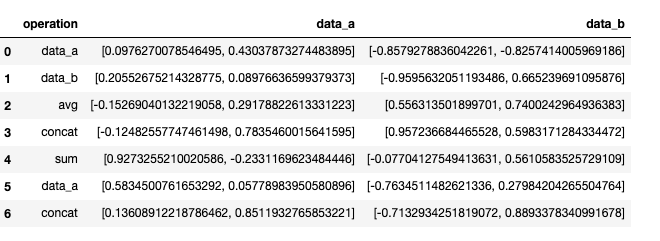I have a data frame, which contains three columns:
import numpy as np
import pandas as pd
np.random.seed(0)
dataframe = pd.DataFrame({'operation': ['data_a', 'data_b', 'avg', 'concat', 'sum', 'take_a', 'concat'],
'data_a': list(np.random.uniform(-1,1,[7,2])), 'data_b': list(np.random.uniform(-1,1,[7,2]))})
Column 'operation' represent merge column, so if there is 'data_a' value in Column 'operation', it means take that particular row's data_a value, if there is 'avg' operation, then take the average of 'data_a' and 'data_b' of that particular row so on.
What I am expecting in the output, a new column contains the values as per the operation column's merge functions:
What I have tried:
dataframe['new_column'] = 'dummy_values'
for i in range(len(dataframe)):
if dataframe['operation'].iloc[i] == 'data_a':
dataframe['new_column'].iloc[i] = dataframe['data_a'].iloc[i]
elif dataframe['operation'].iloc[i] == 'data_b':
dataframe['new_column'].iloc[i] = dataframe['data_b'].iloc[i]
elif dataframe['operation'].iloc[i] == 'avg':
dataframe['new_column'].iloc[i] = dataframe[['data_a','data_b']].iloc[i].mean()
elif dataframe['operation'].iloc[i] == 'sum':
dataframe['new_column'].iloc[i] = dataframe[['data_a','data_b']].iloc[i].sum()
elif dataframe['operation'].iloc[i] == 'concat':
dataframe['new_column'].iloc[i] = np.concatenate([dataframe['data_a'].iloc[i], dataframe['data_b'].iloc[i]], axis=0)
That is obviously not a good way to do this, It's very slow too. I am looking for more pandas version to do this task.


